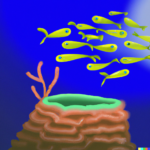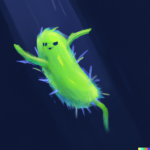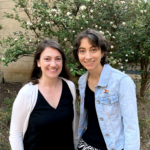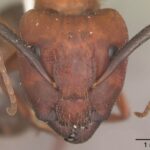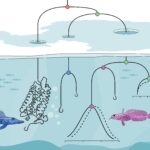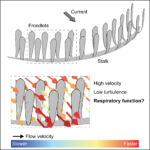Arts and Science Research
Twenty Years of Understanding Genetics in Literature and Society
Dec. 4, 2023—By Andy Flick, Evolutionary Studies scientific coordinator Jay Clayton, William R. Kenan, Jr. Professor of English, first received funding from the National Institutes of Health to study genetics in literature, film and popular culture in 2003. According to the application, this first grant funded, “a working group of scholars in literature, film, and media studies...
Vanderbilt Postdoctoral Researcher Reveals Genomic Secrets of Ocean Sponges
Dec. 4, 2023—By: Sarah Ward Evolutionary Studies graduate communications assistant Picture a thriving marine environment. Perhaps you envision a community as colorful and lively as “Finding Nemo,” where massive schools of fish are flanked by sharks and sea turtles. What about sponges? While perhaps less popular than their flamboyant counterparts, these organisms are the foundation of life...
Researchers Root US Maternal Health Disparities in the Social Environment
Oct. 15, 2023—By: Andy Flick, Evolutionary Studies scientific coordinator Monica Keith, assistant professor of Anthropology, recently published insights into the complex factors contributing to maternal hypertension and health disparities in a paper titled, “Social Determinant Pathways to Hypertensive Disorders of Pregnancy Among Nulliparous U.S. Women” in the journal Women’s Health Issues. This research, based on an analysis...
Researchers Reveal Insights into Bacterial Genome Evolution
Oct. 15, 2023—By Andy Flick, Evolutionary Studies Scientific Coordinator In a new study led by graduate student Carl Stone and his advisor, assistant professor of biological sciences, Megan Behringer, the team studied the effects of DNA repair pathways on genome-wide methylated DNA adenines (6mA). 6mA is a modification to DNA such that a methyl group is added...
Vanderbilt Researcher Illuminates the Impact of Sunlight on Eye Function
Sep. 22, 2023—By: Andy Flick, Evolutionary Studies scientific coordinator A recent study by assistant professor of biology and ophthalmology Gianni Castiglione illuminates our understanding of eye diseases like macular degeneration. The paper, Convergent evolution of dim light vision in owls and deep-diving whales, was published in “Current Biology.” Rhodopsin (RHO), a light-sensitive protein found in the rod...
Evolutionary Studies pilot grant recipients reflect on last year’s research
Jul. 6, 2023—By Kelly Tingle, Evolutionary Studies communications assistant Last year (2022-2023), Evolutionary Studies at Vanderbilt awarded pilot grants to excellent proposals from four members of the ESI community: graduate students Samantha Schaffner (Biological Sciences, Patel Lab), Taiye Winful (Anthropology, Benn Torres Lab), and Katie McCormack (Anthropology, Benn Torres Lab) and Earth and Environmental Sciences Professor Lin...
How do interactions between individuals from different populations contribute to cultural richness?
May. 3, 2023—By: Yotam Ben-Oren (The Hebrew University of Jerusalem), Erella Hovers (The Hebrew University of Jerusalem), and Oren Kolodny (The Hebrew University of Jerusalem), Nicole Creanza Assistant Professor of Biological Sciences (VU) Why are human cultures so diverse? What makes some cultures richer than others? How can very small populations possess very complex cultures? According to...
Vanderbilt researcher finds evidence for ant caste systems driven by chemo-sensing responses
Mar. 13, 2023—By Andy Flick, Evolutionary Studies scientific coordinator Stephen Ferguson, first-author of a new paper with his postdoctoral advisor, Laurence Zwiebel, Cornelius Vanderbilt Chair in Biological Sciences, and two undergraduates associated with the lab, Isaac Bakis (alumnus) and Nicholas Edwards, confirmed the existence of a specialized soldier caste within an ant species in a paper titled,...
Researchers hope insights into low-light vision of Antarctic icefish can promote better understanding of human health
Feb. 27, 2023—By Tatum Lyles Flick, Evolutionary Studies communications volunteer consultant Though many researchers have considered how fish survive in extreme cold, using everything from antifreeze glycoproteins that protect cells to not producing hemoglobin, few have taken a molecular approach to evaluate how they are able to see in such conditions. In “Adaptation of Antarctic Icefish Vision...
Vanderbilt-led Group Discovers Divergent Function in Convergent Evolution of Form
Feb. 22, 2023—By: Andy Flick, Evolutionary Studies scientific coordinator The classic idiom form fits function does not always mean that everything of the same form has the same function. That’s what a group of paleontologists have discovered with the help of fluid physics and preserved fossils. Simon Darroch, assistant professor of Earth and Environmental Sciences, led a...


